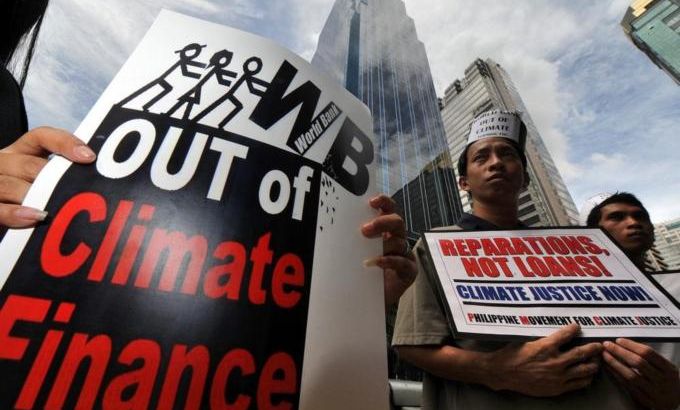
Is the World Bank turning up the heat?
Bank warns dire consequences if global warming is not countered, but its own work may be contributing to climate change.
Extreme heat waves, declining food stocks, and a life-threatening sea level rise: it’s a sobering vision of the future by one of the world’s largest and most powerful institutions.
A report issued by the World Bank earlier this month warns of severe consequences if global warming is not dealt with. But the international organisation may itself be contributing to climate change.
Keep reading
list of 4 itemsAfter the Hurricane
World’s coral reefs face global bleaching crisis
Why is Germany maintaining economic ties with China?
The Bank says the only way climate change can be dealt with is by “co-operative, international actions”.
|
“It was 1992 when the World Bank was asked at the Rio Earth Summit to begin to marshall the funds to address the climate crisis, to help the developing world move away from fossil fuels, and they have done the exact opposite.“ – Daphne Wysham, Sustainable Energy and Economy Network |
Its report says that the world is headed for an average temperature rise of four degrees Celsius by the end of the 21st century, possibly as soon as 2060.
The report also says rising CO2 levels will lead to an unparalleled rise in ocean acidity, which would wipe out the world’s coral reefs and fish stocks.
It also projects that higher temperatures will trigger an extinction crisis among some animal species and a one-metre rise in sea levels by the end of the century.
But the financial institution itself is providing billions of dollars for schemes that contribute to global warming.
According to the Bank Information Center, a watchdog group, in 2010, the World Bank’s funding for fossil fuel projects hit an all-time high of $6.6bn – that’s a 116 per cent increase from the year before. Most of those loans went towards coal.
In Kosovo, the bank is financing a coal power station, which will use brown coal, the most polluting sort. The plant will increase the country’s carbon emissions up to 400 per cent.
In South Africa, $3.75bn in World Bank loans go to Eskom, the largest power utility company in Africa.
|
“While the Bank has been a big funder of fossil fuel projects, they have also made significant – but not sufficient – strides to green their portfolio. What needs to happen is there need to be clear metrics … and there needs to be clear objectives.“ – Daniel Kammen, a former World Bank chief technical specialist |
Eskom is constructing two coal-fired power plants with those funds, but has been criticised for failing to consider the impact on air and water quality.
The international relief and development organisation, Oxfam, recently launched a campaign calling on the World Bank to stop funding large land deals, arguing that such deals increase food insecurity in parts of the world where hunger is already prevalent.
And while the Bank’s own report, Turn Down the Heat, warns of dire consequences for the planet if more action is not taken, it does not provide any concrete steps that must be implemented by international leaders, or by its own organisation.
So, is the World Bank standing in the way of action to combat climate change?
To discuss this Inside Story Americas, with presenter Shihab Rattansi, is joined by guests: Daniel Kammen, the World Bank’s former cheif technical specialist for renewable energy and energy efficiency; Daphne Wysham, the founder of the Sustainable Energy and Economy Network; and Sasanka Thilakasiri, a policy advisor for Oxfam.
WORLD BANK AND CLIMATE CHANGE
- World Bank report says humans are the cause of global warming
- Report: Higher CO2 levels will lead to 150 per cent rise in ocean acidification
- Report: Ocean acidity will destroy fish stocks and coral reefs
- Report: Temperature rise could create species extinction crisis
- World Bank provides 56 per cent of energy financing to fossil fuel projects
- World Bank funding coal projects in India, Kosovo, South Africa
- World Bank clean energy projects also criticised
- World Bank criticised for focus on debt accumulation
- World Bank criticised for focus on private banks